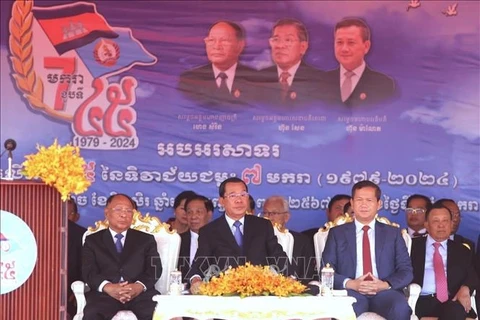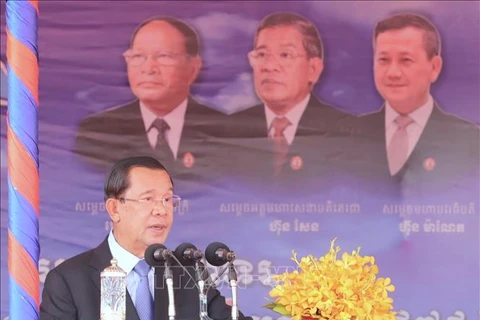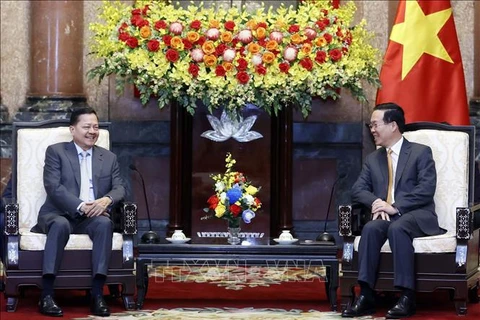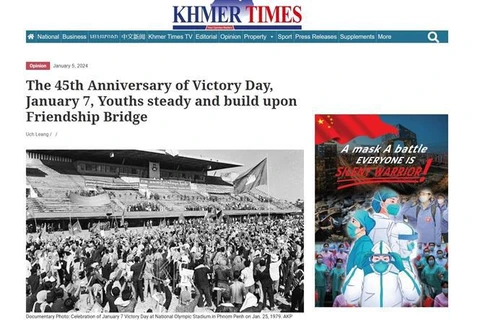Phnom Penh (VNA) – The victory over the Pol Pot genocidal regime on January 7, 1979 turned a new page in Cambodia's modern history, a page written by Cambodian people themselves, Dr. Chhang Youk, Executive Director of the Documentation Centre of Cambodia (DC-Cam) told Vietnam News Agency (VNA)’s correspondent in Phnom Penh.
Sharing his memories of the victory, Dr. Chhang Youk recalled that one day, suddenly Pol Pot's troops fled from Cambodian villages, and at first, the people did not understand the reason. They just thought that Pol Pot's army had all left, so they told each other to take rice, chickens and ducks, and set out on the way home along the highway.
"They wanted to return home, to look for their brothers, their husbands, wives and children, and then on the way, they saw troops of the Cambodian United Front for National Salvation and Vietnamese soldiers," Dr. Chhang Youk said.
"At that time we no longer had any history. The time from 1979 to 1999 was the preface of our history, and we are writing the first chapter on peaceful days starting from December 29, 1998 when peace completely resumed in the country," he said.
Sharing his memories of the victory, Dr. Chhang Youk recalled that one day, suddenly Pol Pot's troops fled from Cambodian villages, and at first, the people did not understand the reason. They just thought that Pol Pot's army had all left, so they told each other to take rice, chickens and ducks, and set out on the way home along the highway.
"They wanted to return home, to look for their brothers, their husbands, wives and children, and then on the way, they saw troops of the Cambodian United Front for National Salvation and Vietnamese soldiers," Dr. Chhang Youk said.
"At that time we no longer had any history. The time from 1979 to 1999 was the preface of our history, and we are writing the first chapter on peaceful days starting from December 29, 1998 when peace completely resumed in the country," he said.
From the perspective of a researcher, Chhang Youk said no negotiations can help end genocide, and a military solution is a must, and a quick reaction is needed to save lives.
He asserted that the friendship between Vietnam, Cambodia and Laos in the past struggle for independence in each country prompted Vietnam to take actions when the country found that Cambodia was falling into genocide under the Pol Pot regime.
The Vietnamese army responded to the friendship and the demand of regional security, the scholar said, emphasising that Vietnam had well performed the country’s responsibility to the regional and international security as well as to a long-time friend.
Dr. Chhang Youk underlined that all the stakeholder at that time, including the Vietnamese army, the Cambodian United Front for National Salvation force and Cambodian people, were all great people.
Despite difference in understanding of the January 7 Victory, a fact that cannot be denied is that 5 million people were rescued and they are the alive witnesses, they write history and reconstruct Cambodia, said the scholar who has conducted research on the genocidal disaster, founded and operated the DC-Cam over the past 30 years. Their existence is evidence of a true story that cannot be forgotten, modified, or changed, he stressed.
“We must not forget the people who participated in building the country from the starting point in 1979, because the contemporary history of Cambodia began with the historical event of January 7, 1979,” stated the scholar.
DC-Cam is a non-governmental organisation tasked with collecting, researching, recording, and archiving images, documents, and records related to the Pol Pot genocidal regime for the purpose of commemorating and claiming justice for the victims. In recent years, DC-Cam has made many efforts to contribute to national reconciliation and heal the mental wounds of survivors of the genocide in Cambodia, including veterans who served the genocidal regime./.
He asserted that the friendship between Vietnam, Cambodia and Laos in the past struggle for independence in each country prompted Vietnam to take actions when the country found that Cambodia was falling into genocide under the Pol Pot regime.
The Vietnamese army responded to the friendship and the demand of regional security, the scholar said, emphasising that Vietnam had well performed the country’s responsibility to the regional and international security as well as to a long-time friend.
Dr. Chhang Youk underlined that all the stakeholder at that time, including the Vietnamese army, the Cambodian United Front for National Salvation force and Cambodian people, were all great people.
Despite difference in understanding of the January 7 Victory, a fact that cannot be denied is that 5 million people were rescued and they are the alive witnesses, they write history and reconstruct Cambodia, said the scholar who has conducted research on the genocidal disaster, founded and operated the DC-Cam over the past 30 years. Their existence is evidence of a true story that cannot be forgotten, modified, or changed, he stressed.
“We must not forget the people who participated in building the country from the starting point in 1979, because the contemporary history of Cambodia began with the historical event of January 7, 1979,” stated the scholar.
DC-Cam is a non-governmental organisation tasked with collecting, researching, recording, and archiving images, documents, and records related to the Pol Pot genocidal regime for the purpose of commemorating and claiming justice for the victims. In recent years, DC-Cam has made many efforts to contribute to national reconciliation and heal the mental wounds of survivors of the genocide in Cambodia, including veterans who served the genocidal regime./.
VNA
























